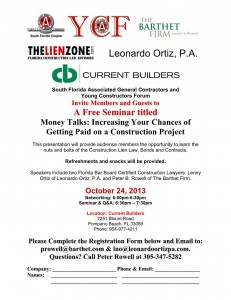Unless you or your company have been involved in a lawsuit you may not be familiar with mediation. Many contracts contain clauses that require mediation of claims as a precondition to filing a lawsuit. Additionally, in Florida judges routinely order parties to attend mediation prior to setting a case for trial.
The mediation conference is typically attended by the mediator, the parties to the dispute, and their respective attorneys. The mediator is a neutral party that is either selected by the parties or appointed by the court. The mediator will oversee the mediation conference which typically begins by the mediator delivering an introduction which includes an explanation of the mediator’s background as well as an overview of how the mediator will conduct the proceedings. It is important to remember that the mediator’s role is to attempt to facilitate a settlement between the parties. The mediator does not make any decisions about the dispute.
The following tips will help you maximize the possibility of successfully resolving your dispute at mediation.
- Be prepared and organize all records and files
- Know your settlement range
- Explore settlement options (i.e. payment over time or alternative security)
- Discuss range of attorneys’ fees to see case through trial with counsel
- Clearly state your position and build trust with opposition & mediator
- Solicit the other side’s perspective
- Do not engage in arguments with other side or personalize statements
- Do not focus on “winning”
Mediators routinely say that no one walks away satisfied from a successful mediation because one party accepted less than they wanted and the other party paid more than they wanted. The goal should always be figuring out the best way to resolve the dispute. Mediation will likely be the only opportunity that you alone get to decide how and when the dispute gets resolved. This is especially important when participating in a court-ordered mediation because if a settlement is not reached then the case will be decided at trial by the judge or jury.



